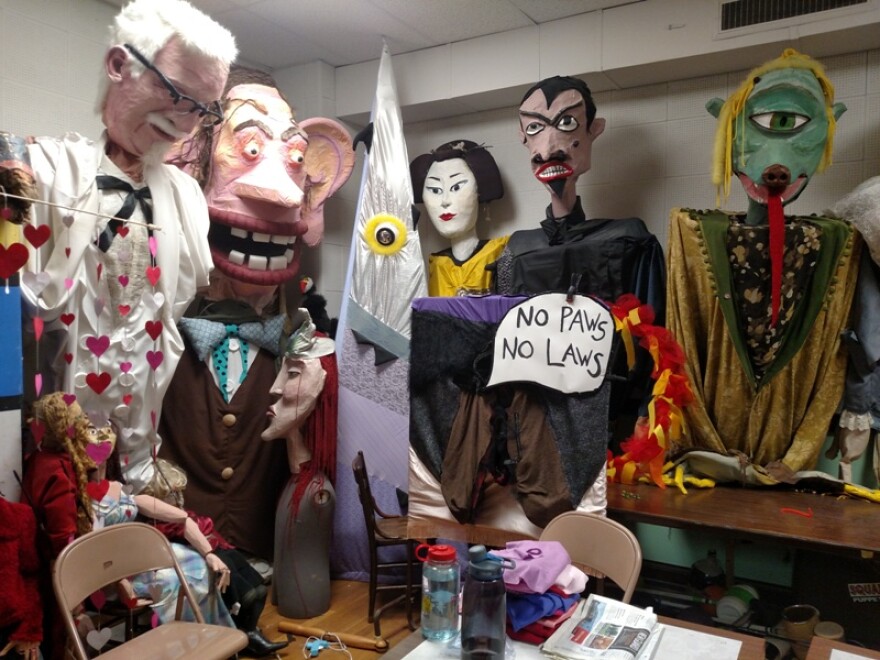Shawn Hennessy and Nora Christensen lead me through the Squallis Puppeteers' storage rooms on the attic-level of Highland Community Ministries. At every turn, we are surrounded by felt, feathers and massive paper mache masks -- like the one belonging to a solemn 9-foot-tall Abraham Lincoln backpack puppet propped in front of me.
Two weeks ago, Abe, accompanied by a George Washington puppet, made an appearance at the Louisville Women’s March.
“Well, I mean we couldn’t not come to the rally. I mean, we are feeling very strongly about what is going on,” Hennessey, the company’s director of development and marketing, says. “We’re really worried and upset about what is happening to our country and we have these giants puppets…”
He trails off, while Christensen, Squallis’ executive director and founding member, picks up: “We wanted to contribute our puppets and our artform to the visual landscape to protest in Louisville," she says. "I really feel committed to that as Squallis -- to be affecting that.”
Using puppets as a form of political protest actually has a long history: from 14th century European marches opposing feudalism, to Vermont’s famous “Bread and Puppet” theater of the 1960s. Christensen even used a giant peace dove puppet to oppose the Gulf War in the 90s.
Now, Squallis wants to continue that tradition.
But -- as with any political statement -- it’s brought up questions one might not consider when it comes to an an artform most often associated with children’s theater: should you make puppets -- which often operate as walking caricatures -- of people who are still living? What about current politicians with whom you disagree?
“It’s hard not to make the angry things because we are so angry,” Christensen says. “It’s so hard not to call shame but there are different ways to do it.”
That different way, they say, is to go positive -- to showcase people and values that need to be celebrated. And that calls for new puppets.
Shortly after the Women’s March, Squallis posted a question on social media:
“Which historical figures would you like to see as puppets at rallies and marches?”
According to Hennessey, this post generated more engagement than any in the past; the answers ranged from Susan B. Anthony to Martin Luther King Jr.
They finally decided on two, Lady Liberty and Albert Einstein, who will be debuting in the spring. Both, Christensen says, conjure images of inclusivity (Einstein was both a scientist and immigrant) and critical thinking.
Squallis will also bring out some old puppets and use them in new ways. Christensen points to a quilt slung over a rack in the corner of the room -- on which a cardboard speech bubble reads “No Paws, No Laws.”
It represents the female anatomy and was used about a decade ago in a puppet show about home birth.
“It’s really useful now when we are talking about women’s rights and the laws affecting women’s bodies,” Christensen says.
As we leave the storage space, Hennessey and Christensen walk me out through the puppetry studio. A space overflowing with craft supplies -- which, in this case, are the unexpected building blocks of political protest.



